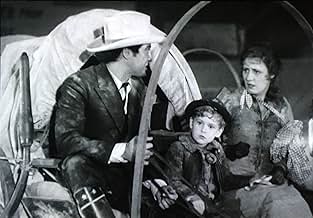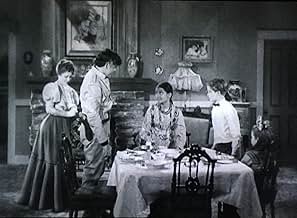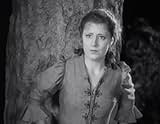IMDb RATING
5.8/10
7.4K
YOUR RATING
A newspaper editor settles in an Oklahoma boom town with his reluctant wife at the end of the nineteenth century.A newspaper editor settles in an Oklahoma boom town with his reluctant wife at the end of the nineteenth century.A newspaper editor settles in an Oklahoma boom town with his reluctant wife at the end of the nineteenth century.
- Won 3 Oscars
- 7 wins & 5 nominations total
Roscoe Ates
- Jesse Rickey
- (as Rosco Ates)
Judith Barrett
- Donna Cravat
- (as Nancy Dover)
Max Barwyn
- Sabra's Luncheon Greeter
- (uncredited)
Frank Beal
- Louis Venable
- (uncredited)
Tyrone Brereton
- Dabney Venable
- (uncredited)
Dolores Brown
- Adult Ruby Big Elk
- (uncredited)
Featured reviews
This is a comment following up to a previous post. Richard Dix was a big silent film star before Cimarron. He was one of the few silent actors who successfully made the transition to talking pictures. I hardly recognized Irene Dunne at first, this was only her second film. This film is fun to watch as the talent of the actors is evident. People must keep in mind that the sound quality, sets, etc. were all still relatively new in 1931. Actors and directors were accustomed to silent movies. The costumes, performances, and sets are quite good, in my opinion. Once gets a feel for how the home life, new life in the southwest, and the timeless snobbery of the town "ladies." The courtroom scenes are intense. The writing was realistic for the time period. Scathing accusatory and judgmental remarks to browbeat and break the woman's spirit. A very moving picture.
Despite it's awards for best picture and best adapted screenplay, this first film version of the popular soap-opera/western novel is badly dated and with plenty of overacting, though it's really a handsome-looking production. The best thing about this, is the atmospheric cinematography and the fantastic costumes and sets, particularly in the exterior scenes of the growing town of Osage.
Richard Dix certainly has great screen presence, but here he's kind of hammy, acting in a manner more suitable to silent film or the stage.
I can't help but compare this to the 1960 remake, of which this version is actually quite preferable. The remake starts out vastly superior, but squanders it's entertainment value when it turns into the cinematic equivalent of nails on a blackboard, while this version starts out as a mixed-bag and stays pretty much consistent the whole way through.
Still, much like the remake, this suffers greatly after Dix takes a hike the first time around and the picture becomes rambling, winding down to an unsatisfying conclusion.
Richard Dix certainly has great screen presence, but here he's kind of hammy, acting in a manner more suitable to silent film or the stage.
I can't help but compare this to the 1960 remake, of which this version is actually quite preferable. The remake starts out vastly superior, but squanders it's entertainment value when it turns into the cinematic equivalent of nails on a blackboard, while this version starts out as a mixed-bag and stays pretty much consistent the whole way through.
Still, much like the remake, this suffers greatly after Dix takes a hike the first time around and the picture becomes rambling, winding down to an unsatisfying conclusion.
The outstanding but admittedly dated "Cimarron" dazzled audiences so much that it was a runaway Best Picture Oscar winner in 1931. The film is novelist Edna Ferber's epic tale of the early American settlements of Oklahoma from 1889 and goes to the economic unrest of the Stock Market crash of 1929. Richard Dix (Oscar-nominated) immediately moves his family out to the untamed land and starts a new life. Wife Irene Dunne (Oscar-nominated) has doubts not only about the new land, but also about her husband's adventurous nature. Dix is an individualist with itchy feet and thus he comes and goes as he pleases, but always seems to come through for his family and his adopted state when the chips are down. "Cimarron" is an abbreviated history of a land which was once wild and untamed that slowly became modern by the early-20th Century. The views upon African-Americans and Native Americans is given much air time here. Ferber's equally riveting "Giant" posed similar questions towards Texas' views of women and Hispanic Americans. She was a truly gifted writer and her novels were both adapted into stunning motion picture experiences. Wesley Ruggles' (Oscar-nominated) direction is a bit prodding and the film does stall a bit due to its length, but overall "Cimarron" is an important American movie that if nothing else created the legitimate Western genre. 4.5 out of 5 stars.
This gargantuan war-horse of a western epic won the Oscar as the Best Film of 1930/31 proving from the earliest days of the Academy it was quantity not quality that mattered and that big equalled best. Of course there wasn't much in the way competition, ("East Lynne", "The Front Page", "Skippy" and "Trader Horn"). Much better films like "Morocco", "The Criminal Code" and "Little Caesar" failed to make the short-list. But it is still surprisingly robust and enjoyable in the way that these kind of movies sometimes are, (it's certainly a lot less po-faced than the dire 1960 remake), and it has some really good things in it; a great church meeting sequence and a very well staged hold-up culminating in a great moment when a young black boy is killed and is ignored in the general mêlée and is a brave scene for the period, and a sequence probably deemed too contentious for the remake.
The acting, too, is a cut above the average for the time. A young, fresh-faced Irene Dunne is lovely and shows considerable promise here and Richard Dix has a kind of screen presence. It's ham and he plays to the gallery but he's very likable. Estelle Taylor is touching as the whore with the obligatory heart of gold and Edna May Oliver is very funny but in too small a role.
It runs out of steam before the end. It's top heavy in the plot department, (based, as it is, on an Edna Ferber door-stopper), and characters come and go without making much of an impression. Often listed in polls of the worst films to win the Best Picture Oscar it has vigour and a complete lack of pretension. I'll take it any day over "A Beautiful Mind".
The acting, too, is a cut above the average for the time. A young, fresh-faced Irene Dunne is lovely and shows considerable promise here and Richard Dix has a kind of screen presence. It's ham and he plays to the gallery but he's very likable. Estelle Taylor is touching as the whore with the obligatory heart of gold and Edna May Oliver is very funny but in too small a role.
It runs out of steam before the end. It's top heavy in the plot department, (based, as it is, on an Edna Ferber door-stopper), and characters come and go without making much of an impression. Often listed in polls of the worst films to win the Best Picture Oscar it has vigour and a complete lack of pretension. I'll take it any day over "A Beautiful Mind".
Cimarron was an early talkie that made great strides in sound, allowing natural interaction between the cast and a more natural movement of the camera, allowing the filming of some truly spectacular scenes. The shots of the Oklahoma Land Rush stampede involve ground-breaking sound and cinematography that make it one of the most realistically shot scenes up to that time. Other well filmed scenes include those of Osage's dusty streets with the camera tracking the main characters as they walk along while hundreds of extras bustle about them, showing the life of a busy boom town shortly after the land rush. Unfortunately, this is pretty much where my praise of this film ends.
This film stars Richard Dix as Yancey Cravat, a man who was born under a wandering star. Unfortunately, that didn't stop Yancey from taking a wife and having children, it just stopped him from taking any responsibility for that same wife and children. Through the years, Yancey chases one hair-brained scheme after another while his long-suffering wife Sabra (Irene Dunne) takes responsibility for the newspaper Yancey started but abandons time and again. Sometimes Yancey's adventures keep him home, other times they take him away for years at a time. The film focuses on Yancey's adventures, while the whole time I'm wondering what Sabra is up to. In modern times, her story is much more compelling and sympathetic than Yancey's.
Richard Dix's performance is quite hammy by modern standards. You'll find yourself laughing in places that were not intended to be funny by the film's creators, and in spite of your laughter, you'll still find Yancey to be completely unlikeable. He would make a great politician in the 21st century - he is very apt at doing one thing, saying another, and still finding time for splendid oratory. Unfortunately, this film was my introduction to Dix. I didn't see another one of his films for a long time and, when I did, I was surprised to find out how good he was in his smaller non-Academy recognized performances.
Remarkably, this film won the Oscar for Best Picture in 1931. Even more remarkably, Richard Dix was nominated for Best Actor for his performance in this film. Not remarkably, Irene Dunne was nominated for Best Actress for her performance, in spite of the lack of depth of the examination of her character in the film. Thus I'd say this film is worth it just to see the very good technical achievements it featured in sound and cinematography and Dunne's performance as the long suffering Sabra.
This film stars Richard Dix as Yancey Cravat, a man who was born under a wandering star. Unfortunately, that didn't stop Yancey from taking a wife and having children, it just stopped him from taking any responsibility for that same wife and children. Through the years, Yancey chases one hair-brained scheme after another while his long-suffering wife Sabra (Irene Dunne) takes responsibility for the newspaper Yancey started but abandons time and again. Sometimes Yancey's adventures keep him home, other times they take him away for years at a time. The film focuses on Yancey's adventures, while the whole time I'm wondering what Sabra is up to. In modern times, her story is much more compelling and sympathetic than Yancey's.
Richard Dix's performance is quite hammy by modern standards. You'll find yourself laughing in places that were not intended to be funny by the film's creators, and in spite of your laughter, you'll still find Yancey to be completely unlikeable. He would make a great politician in the 21st century - he is very apt at doing one thing, saying another, and still finding time for splendid oratory. Unfortunately, this film was my introduction to Dix. I didn't see another one of his films for a long time and, when I did, I was surprised to find out how good he was in his smaller non-Academy recognized performances.
Remarkably, this film won the Oscar for Best Picture in 1931. Even more remarkably, Richard Dix was nominated for Best Actor for his performance in this film. Not remarkably, Irene Dunne was nominated for Best Actress for her performance, in spite of the lack of depth of the examination of her character in the film. Thus I'd say this film is worth it just to see the very good technical achievements it featured in sound and cinematography and Dunne's performance as the long suffering Sabra.
Oscars Best Picture Winners, Ranked
Oscars Best Picture Winners, Ranked
See the complete list of Oscars Best Picture winners, ranked by IMDb ratings.
Did you know
- TriviaThe celebrated land rush sequence took a week to film, using 5,000 extras, 28 cameramen, six still photographers, and 27 camera assistants. The scene is so iconic that, three decades later, when MGM remade the film, the camera angles for the land rush sequence remained almost identical to the original.
- GoofsDuring the period of the film set in 1907, Yancey is the Progressive Party's candidate for governor of Oklahoma. The Progressive Party did not form until 1912, and then disbanded after Theodore Roosevelt's unsuccessful third party candidacy that year.
- Quotes
Mrs. Tracy Wyatt: One of my ancestors was a signer of the Declaration of Independence.
Sol Levy: That's all right. A relative of mine, a fellow named Moses, wrote the Ten Commandments.
- ConnectionsEdited into Land of the Open Range (1942)
- How long is Cimarron?Powered by Alexa
Details
Box office
- Budget
- $1,433,000 (estimated)
- Runtime
- 2h 3m(123 min)
- Color
Contribute to this page
Suggest an edit or add missing content






































